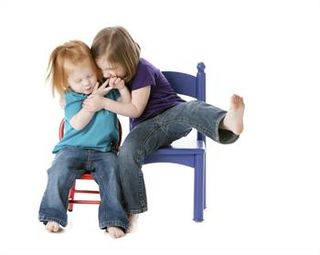Family Dynamics
Why Kids Hit Siblings and How to Help Them Stop
How do we help children manage their emotions so they can manage their behavior?
Updated May 16, 2024 Reviewed by Gary Drevitch
Dr Laura,
My 4-year-old hits my 9-month-old. It is very hard to see any danger signs with him as he will push or hit her out of the blue. One minute he is sitting there patting her gently and cooing and then in a flash he will push her over or hit her. There is not much outward anger in his feelings so I struggle to know how to deal with the situation as I feel silly saying to him, "You are angry" when he shows no signs at all of being angry or upset; he seems to just do it for the fun of it.
— Belinda
If we saw his anger, frustration, or jealousy it would be easier because at least we could understand that. But when he acts like a cold-blooded bully "for the fun of it," that strikes terror into our hearts: We're afraid that our child is becoming a monster. But although he is acting monstrously, he is not a monster. He is our child, showing us in the only way he knows that he desperately needs our help.

Most parents, though, find it hard to help our kids with big feelings, because we never learned how to manage our own feelings (except to numb ourselves through "little addictions" like food or screen time). In fact, we find that when our child cries or rages, it pushes all our buttons. Unbearable feelings swamp us. So we, too, lash out to avoid our own feelings. Instead of helping our child with his feelings, we punish him. Or, if we realize that punishment will make things worse, we say sternly, "No hitting! Hitting hurts!" and hope that's the end of it.
Except it isn't the end of it. You can count on him hitting her again, because he still has all those monstrous feelings. They war within him against his affection for his little sister. He will pat her gently and coo over her, and to his shock suddenly find himself gripped with the desire to clobber her. That doesn't mean he's a monster; it means he's a small child trying to manage feelings that have undone many older humans. As my son said about his baby sister when he was four, "I hate her. I don't know why. I just do." (Positive prognosis department: They're now 23 and 19 and adore each other.)
So the reason your child has a blank expression is because he is trying NOT to feel at those moments. What he feels — the fear that he isn't good enough compared to the baby, the grief of having lost his special place in your family and in your heart — is so upsetting that he can't bear it. When it starts to swamp him, he lashes out so he won't have to feel it. The reason his face looks blank is that he is trying to numb himself.
Unfortunately, every time he chooses to push her down instead of pat her gently, he deadens his empathy. Every time we respond with anger, his heart hardens more. Soon we see only a mask of numbness, the blank expression of a fortress.
How do we reach through that fortress to help our child reclaim his heart and his empathy? How do we help him manage his emotions so he can manage his behavior? Most advice tells us to start spending more time with him. That's essential, but "attention" is not enough to heal what's going on. Any child who repeatedly hits is showing that he feels like a monster, and he knows he can't trust us to understand his monstrous feelings. So he pushes all those terrible feelings down inside, but that means he's pushing away good feelings, too. He disconnects from us. His cup is empty, but filling it is tough because he can't take in our love. So we have to build trust, safety, and connection, and then we have to help him with his tangled-up feelings.
1. Connect with him in healing ways. Building trust and connection by spending half an hour a day just being 100 percent present with him is an essential start. Let him decide what to do with the time. Just pour your love into him and ignore all distractions. He will love being the center of your attention, knowing that making him happy matters that much to you. Maybe most important, he will see how much you enjoy him, which is the foundation of his feeling of self-worth.
2. Build safety, and help him giggle out his worries, through play. Every child needs to giggle every day, and a child who hits REALLY needs to giggle about aggression and fear, so any mock aggression games that get him giggling will be very healing and will strengthen your connection to him. Most kids will come up with the games they need:"Let's play I'm the monster and I'm scaring you!" Ham it up and act mock-terrified. If he doesn't, start a pillow fight and act terrified of him when he comes after you with the pillow. If he giggles, you'll know you're on the right track.
You can also initiate a game of stuffed animals in which a new baby enters the family. Let him take the lead on all the misadventures that are bound to befall the baby, as it is accidentally fed to the sharks or thrown into the garbage. Play is nature's harmless way of helping children process their emotions, and anything that gets him giggling is venting some of those same emotions that otherwise cause tears. (There are more games on the Peaceful Parent, Happy Kids website and in my book.)
Another way to help your child surface his feelings is reading books that get the discussion going. Here's a whole page of books for older sibs about the new baby. Just be sure that the book shows that all feelings are allowed, but doesn't show siblings engaging in unkind behavior, which is not the role-modeling you want. Hopefully these books will get him giggling, as the protagonist makes forbidden remarks about how the new sibling is smelly or a nuisance.
While reading books together is a great way to get your child laughing, don't be surprised if he hurls the book across the room. If he doesn't want to have the discussion, you've struck a chord. Acknowledge his feelings gently: "You don't like this book! I wonder if sometimes you feel bad inside about OUR baby." You don't need to analyze whether what he feels is rage or jealousy. He's felt it all. Just acknowledge what you see: "You are upset" or "You threw the book; you don't want to read it."
3. When your child hits, go first to the sibling who is hurt. You'll feel an urgent need to teach your little hitter a lesson, but just stop and take a breath. The child who needs you right now is the one who is hurt. Talk to the hitter later; he isn't going anywhere. Comforting your hurt child will move you into a more nurturing place, which is what you need to access when you deal with your hitter. I know: You want to punish him. But what you really want is to stop the hitting, and the only way to do that is to help him with his feelings. That means you have to see it from his perspective, not see him as the enemy.
4. Help him get past his anger to the tears and fears beneath. When he hits, even if you don't see any sign of a specific emotion, you can trust that upsetting feelings are driving his actions. After you make sure your other child is OK, your goal is to help your child surface his feelings so he can "show" them to you and let them go. The good news about human emotions is that once we feel them, they vanish.
So move right in close, get down on his level, and look him in the eyes. You may see only a blank expression. Keep breathing and remind yourself that he is a good kid who needs your help, so you can stay kind and calm. Empathize. "That was hard....Your sister was crying...I see you felt bad....Tell me about it."
Create a safe space for him to show you how he feels. It's lonely behind that mask. If he doesn't speak up, begin describing what you think he might feel: "I wonder if it's hard for you sometimes, to have the baby in our family now..."
As you summon up all your compassion and try to see it from his point of view, his anger will break through his numbness and he may begin to shout at you how much he hates you, or his sister, or his life. That's good: Anger dissolves the numbness. Tell him it's OK to be angry, that you want to hear more about it. Stay calm, and kind, and empathize: "Oh, Sweetie, you feel like I am mean, and never understand? I'm so sorry. That must hurt so much." You won't need a lot of words, just your open heart.
You may have tears in your eyes, which is part of what will move him into his own tears. Once he breaks through to his fear, he may writhe and struggle and yell and sweat. Eventually, he will be crying in your arms.
5. Support the part of your child that is doing such brave battle inside, the part that is good and true and would protect his sister if anyone else threatened her. Notice every positive thing he does, especially (but not only) in relationship to his sibling, and say what you see:
- "When you showed the baby your toy, she was so happy."
- "You are patting so gently."
- "The baby always laughs more for you than anyone. She worships you."
6. Encourage the sibling bond to strengthen the part of your child that wants to protect his sibling. Sit your older child on the couch next to you and put the baby in his lap. Teach him how to "smell" the top of her head. Researchers believe that the pheromones given off by the top of a baby's head disable our aggressive impulses, making it more likely that babies will survive to pass on their genes. The more often your older child inhales your baby's pheromones, the more protective he will be of her.
There are many other ways to encourage the sibling bond. Play games in which the two of them team up against you. Make a book with photos of them having fun and read it regularly. Encourage them to make drawings for each other. Help each one make or buy small presents for the other, even if the baby doesn't really understand what's going on. Let your older child be important in the baby's life by helping in ways that make him happy: "Sounds like our baby woke up; let's go get her." Reduce rivalry in every way you can think of, such as by saying, "As soon as my hands are free, I want to help you with that," rather than, "I'm busy with your sister right now. I will help you next."
7. Prevention. It is our responsibility to keep our children safe. We might think you should be able to leave a nine-month-old alone with a four-year-old, but right now, you have learned, you can't. Wishing things were different is a disservice to both children. Just don't do it, and stop resenting it.
I'm not saying to blame yourself when someone gets hurt. I am saying to take responsibility for prevention, just as you would with any other danger. When he pets her, move in close. Smile and say, "I am right here, Sweetie. I will help you be gentle." When you notice that he's getting cranky, sit with him in his chill-out nook to help him refuel, or encourage him to spend some replenishing quiet time there himself. If he does hurt her, take your share of the responsibility that you weren't there to help him with his feelings and prevent it. That will make him less defensive, so it's easier for him to take his own share of the responsibility.
This won't last forever. Once you help him with his feelings, he'll start managing them better, which is what lets him manage his behavior. And sooner or later, your children will forge a deep bond of their own.




